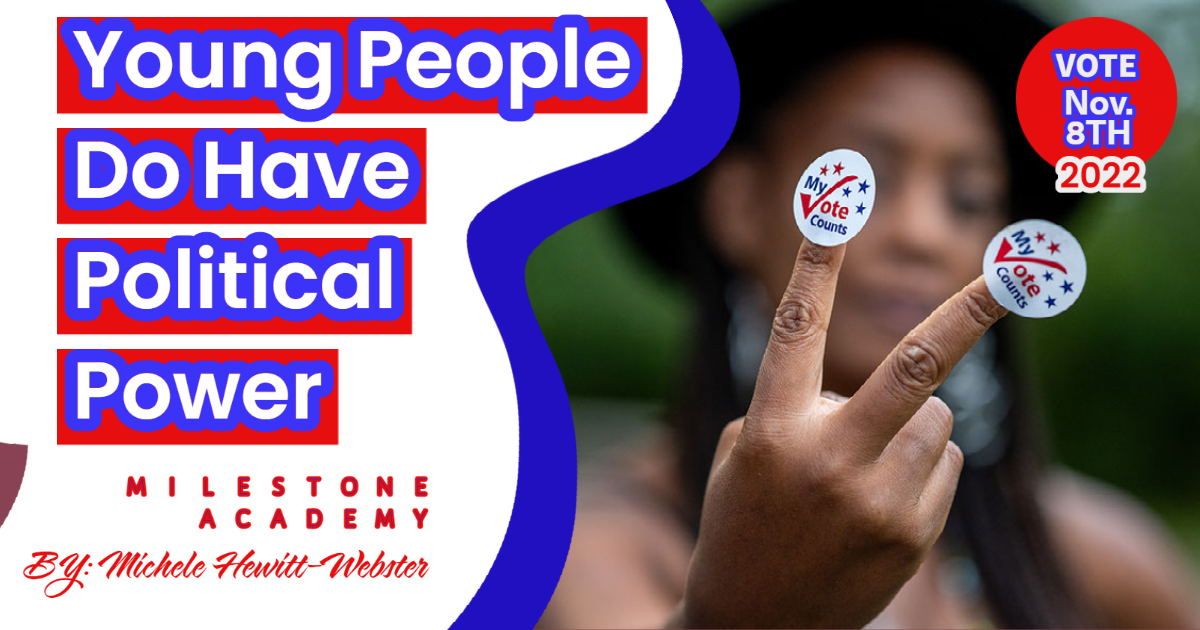Students Involved with Politics

Written By: Michele Hewitt-Webster | MileStone Academy November 2022 Newsletter
Should high school students be involved in politics?
Students involved in politics? Most high school students are not old enough to vote, but their voice matters.
Becoming involved can create opportunities to gain experience, impact their communities and open themselves up to scholarship and career opportunities.
There are many kinds of political involvement. Activism is one approach, but there are many other ways to get involved in the political arena, such as joining a club at school, volunteering with grassroots organizations, or working directly with political parties and candidates.
There are many kinds of political involvement. Activism is one approach, but there are many other ways to get involved in the political arena, such as joining a club at school, volunteering with grassroots organizations, or working directly with political parties and candidates.
Students should research current issues by looking at various perspectives and seeing how they affect them and their community. They can make a difference; we continue to see the impact of young people on important issues. For instance, climate change, gun violence, and debates around curriculum and book bands in their schools.
They are joining an organization, continuity to enhance skills valued in the workplace, such as organization, teamwork, and leadership. Students will have a chance to network with community leaders and learn about scholarships and career opportunities.
Getting involved in politics has several benefits for a student and their community. For example, the community receives an informed advocate. While the student learns valuable career skills that can be listed on a resume, they may find scholarships and career opportunities.
Ways for Students to Get Involved in Politics
-
LEARN ABOUT AN ISSUE:
Most critical issues today are complicated, and students should explore multiple perspectives using many sources to separate facts from opinions.
-
ATTEND TOWN HALLS, SCHOOL BOARD MEETINGS, AND CITY COUNCIL MEETINGS:
Local town halls, school board meetings, and city council meetings can be great learning experiences because they focus on local issues for the student. The students have a chance to learn about issues changing their community.
-
WATCH DEBATES:
Debates allow students to hear multiple viewpoints on an issue.
-
VOLUNTEER:
Many politically oriented organizations allow teens to volunteer.
-
CONTACT LEGISLATORS:
Even if a student cannot vote, that doesn’t mean elected officials can’t hear their voice. Anyone is allowed to reach out to legislators and share their perspectives. They can call or write to their local Congressperson at the federal and state levels.
Similarly, reaching out to mayors, governors, and other government leaders is something they can do if they want their viewpoints considered.
-
WRITE POSTS AND BLOGS:
Students can also share their thoughts openly by writing social media or blog posts. If your student has strong writing skills, discussing issues in social media posts or a blog could give them a platform to be heard.
CAUTION: A person’s online presence could change a college admissions department’s decision and future career prospects. In some cases, the effect is positive. However, if the viewpoint is polarizing or controversial, there could be some fallout. They may be exposed to negativity if they write on a platform that allows comments.
